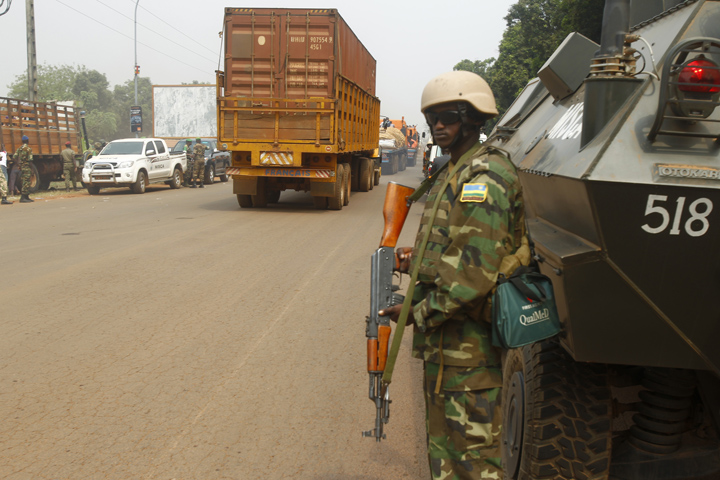
Peacekeeping troops escort a humanitarian aid convoy in mid-February in Bangui, Central African Republic. A Comboni missionary in the country, recounting the violence taking place around his parish in the capital, expressed hope that Pope Francis' planned visit would open people's hearts to God's love and "renew the face of this beautiful country drenched in blood." (CNS/Legnan Koula, EPA)
A Comboni missionary in the Central Africa Republic, recounting the violence taking place around his parish in the capital, expressed hope that Pope Francis' planned visit would open people's hearts to God's love and "renew the face of this beautiful country drenched in blood."
Comboni Fr. Moses Otii Alir's description of the violence around Our Lady of Fatima Parish in Bangui was posted on the Comboni website Nov. 6. Pope Francis is scheduled to visit Bangui Nov. 29-30.
Alir said a group of Muslim youths, seeking a stolen motorcycle, came to the neighborhood Oct. 29 and got into "a violent clash with some thugs" from the area. Three of the Muslim youths were killed, setting off a wave of reprisals.
"On their way to the parish, they started looting and burning all the houses and shops," the Comboni said. "They gathered in front of the parish gate, wanting to destroy the church and butcher all of us."
One of the 10 soldiers from the U.N. peacekeeping mission was wounded, Alir said. The parish has been protected by peacekeepers since a 2014 attack on the church and the displaced people it shelters.
"The shootings and the burning of houses lasted almost 10 hours," the priest said.
The next day, except for "occasional gunshots," the situation was quiet, so Father Alir and some of the soldiers went to visit the neighborhood around the parish. "What we saw is shocking. The destruction is beyond imagination."
The looting and burning of houses continued that evening, Oct. 31 and Nov. 1 as well, he said. In his Angelus address Nov. 1 Pope Francis expressed his solidarity with "the Comboni Fathers of our Lady of Fatima Parish in Bangui, which hosts numerous displaced people."
Writing Nov. 4, Alir said the neighborhood around the parish was still "in the hands of the assailants. It is very difficult to get out of the parish compound."
"The situation does not seem to be getting better," he said. "We do not know what could happen from one moment to the next."
The country has been the scene of violence and upheaval since 2013. Although religious leaders insist the conflict is political and ethnic, the fighting has divided the country on religious lines -- with mostly Muslim rebel forces battling mainly Christian militias. Local Christian and Muslim leaders, as well as organizations such as the U.S. bishops' Catholic Relief Services, are bringing people from all faiths together in an effort to sow peace.
